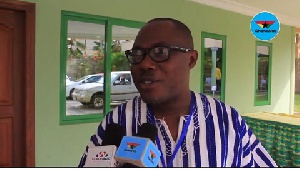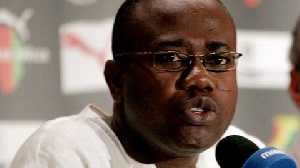An associate professor at the University of Ghana has described as “elementary knowledge,” the President’s assertion that the weakening value of the cedi is the result of Ghana’s over dependence on imported goods.
Professor Ransford Gyampo argued Wednesday that there are major causative factors causing the depreciation of the cedi other than what he termed the “basic export-import explanation” given by President Nana Akufo-Addo on Tuesday.
He said it is basic knowledge that a country that imports more than it exports, would run into balance of payment deficits and have serious issues with its currency stability.
The cedi performed poorly last week as it depreciated from 4.9 cedis to around 5.6 cedis per a dollar, triggering agitation among businesses in particular and Ghanaians in general due to increases in goods and services including petroleum products.
At a meeting with some members of the Ghana Bar Association Tuesday, Nana Akufo-Addo asserted Ghanaians’ taste for imported goods against locally manufactured products is blameable for the yearly depreciation of the cedi against major international trading currencies.
“We live in a country where we are overly dependent on the importation of things for our daily sustenance, things we can produce we continue to import them and at the same time, we don’t generate enough exports.
“That is the issue on the current account, the persistent deficit in our national income statistics on current account. That is what gives rise to the frailty or our currency,” Nana Akufo-Addo said.
He thus asked that the national discourse is focused “much more on some of the structural problems involved in our currency,” noting “there are structural problems we so far do not articulate loudly enough in my view”.
But Prof Gyampo has raised questions with the President’s assertion.
He said for Nana Akufo-Addo to say “…more imports than exports depreciates a country’s currency, is a text book elementary knowledge”.
“I know there are other major causes of the currency depreciation problem beyond the basic export-import explanation, and the solution doesn’t necessarily lie in public discourse as advocated by the President” he stated in an article.
In his view, advocating a public discourse for the resolution of the fast depreciating currency “is anti-thesis to the idea of political trusteeship”.
“How many citizens understand the causes of the depreciation challenges?” he asked, indicating that such public discourse may “potentially pander to ignorance” as not too many people know the intricacies of the cedi depreciation.
The political scientist stated under political leadership, governments should only consult the citizenry on matters that directly affect them, which he said, they have superior knowledge about in terms of solutions.
“In my candid opinion, it cannot be part of any reasonable argument to say that the ordinary Ghanaian wields superior knowledge on solutions to currency depreciation than government. So, public discourse, though an important ingredient of democracy, is certainly not the best option in resolving this technical issue,” he held.
For him, the solution to the regular depreciation of the cedi lies in policy formulated and implemented by a competent government with the political will and leadership to accomplish whatever it sets out to do.
He said governments are entrusted with the country not to only explain the problems, but “must have the competences to act” on behalf of the people by initiating proactive measures to addressing such problems.
“If such competences are lacking among their appointees, as is experienced in winner-takes-all politics, they must look for experts outside government to help,” he suggested.
He averred that any government surrounded by appointees who do not have the expertise and competence to act to deal with problems, “would always have sleepless nights”.
“Any government that cannot swiftly assemble the right calibre of people to resolve matters of pressing concerns to the public, has no business being in government. Indeed, a government outlives its usefulness if it calls for public dialogue on matters that many people wield no superior knowledge about,” Prof Gyampo stated.
The NPP government, he said, “I believe, should still have the men and women, as well as the capacity to scale over the petty shackles of winner-takes-all politics to attract other brilliant non-partisan minds to assist.
“It is not a crisis situation yet. There is hope to slow down the fast depreciating currency and regime political goodwill,” he concluded.
Click to view details



Business News of Wednesday, 20 March 2019
Source: 3news.com







![Deputy Minority Leader, Emmanuel Armah-Kofi Buah [L] and First Lady Rebecca Akufo-Addo Deputy Minority Leader, Emmanuel Armah-Kofi Buah [L] and First Lady Rebecca Akufo-Addo](https://cdn.ghanaweb.com/imagelib/pics/114/11465182.295.jpg)









